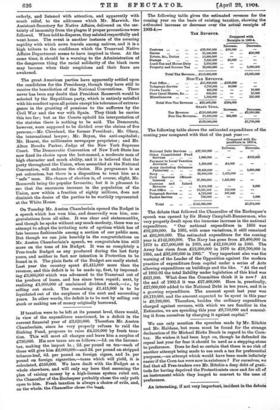If taxation were to be left at its present level,
there would, in view of the expenditure sanctioned, be a deficit in the current financial year of £3,820,000. Therefore Mr. Austen Chamberlain, since he very properly refuses to raid the Sinking Fund, proposes to raise £4,550,000 by fresh taxa- tion. This will meet all charges and leave him a surplus of £730,000. His new taxes are as follows —1d. on the Income- tax, making the impost ls. ; 2d. per pound on tea—each of these will give him £2,000,000—and 3d. per pound on stripped tobacco-leaf, 6d. per pound on foreign cigars, and la. per pound on foreign cigarettes,—taxes which will yield, it is calculated, £550,000. We have dealt with the Budget as a whole elsewhere, and will only say here that assuming the plan of raising money by a high-license system ruled out, the Chancellor of the Exchequer probably chose the only path open to him. Fresh taxation is always a choice of evils, and, on the whole. the Chancellor chows the lease, We can only mention the speeches made by Mr. Ritchie and Mr. Haldane, but room must be found for the strange declaration of Sir Michael Hicks Beach in regard to the Corn- tax. He wishes it had been kept on, though he defended its repeal last year for fear it should be used as a steppingstone to preference. Does he feel so certain that there is no risk of another attempt being made to use such a tax for preferential purposes,—an attempt which would have been made infinitely easier if the Corn-tax were now in existence P For ourselves, we feel that all Free-traders owe Mr. Ritchie a deep debt of grati- tude for having deprived the Protectionists once and for all of an instrument which they longed to convert to the uses of preference.
An interesting, if not very important, incident in the debate










































 Previous page
Previous page